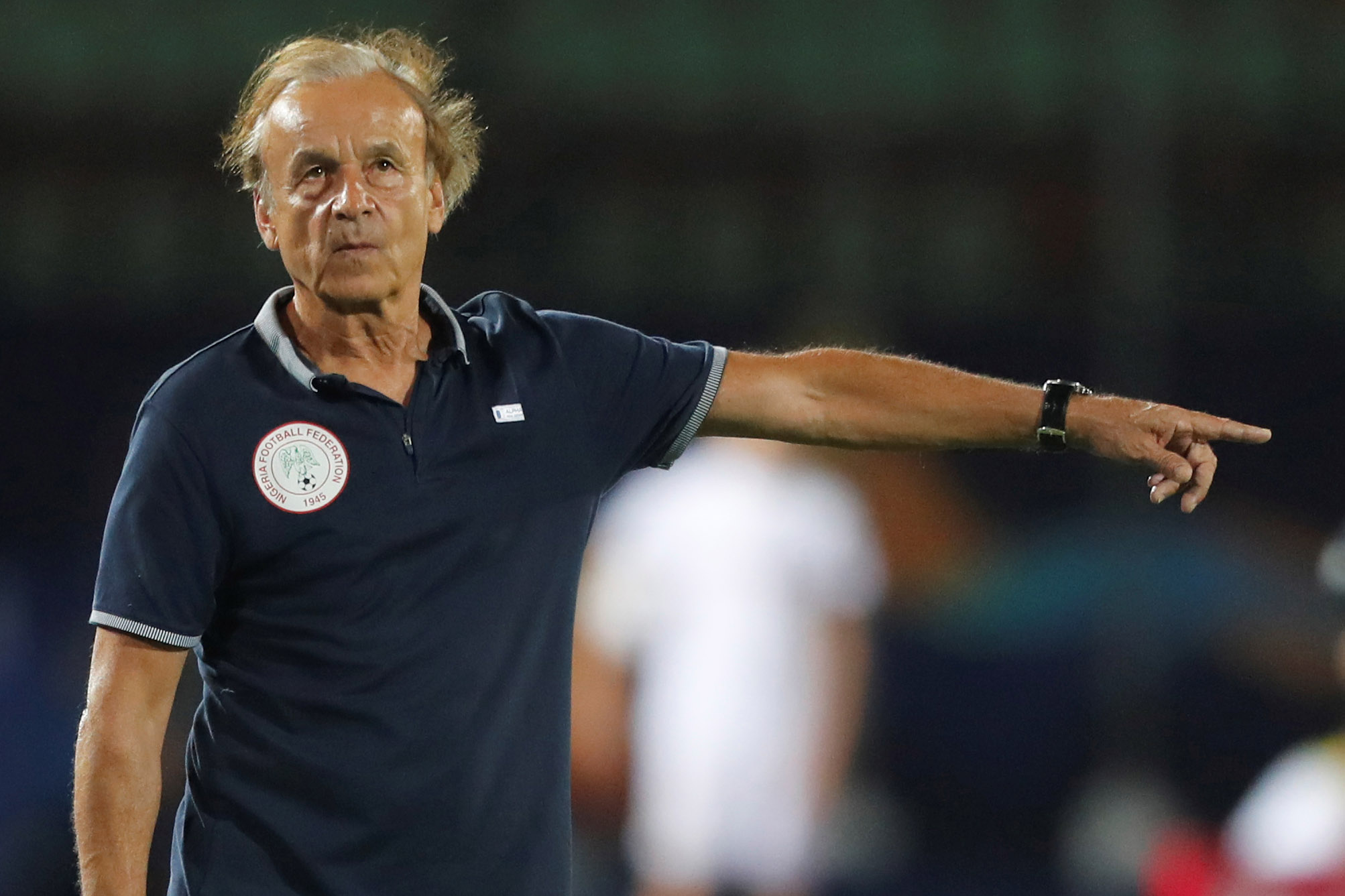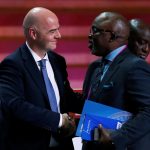Nigeria’s complicated relationship with Gernot Rohr
The German coach of Nigeria’s national football team has had a tumultuous relationship with the country’s football federation – and it looks set to continue for a few more years.
Author:
20 May 2020

Nowhere is the shifting nature of loyalty in football more apparent than in the relationship between coaches and administrators. The current state of affairs between the Nigeria Football Federation (NFF) and national team coach Gernot Rohr perfectly illustrates this.
It’s an uneasy alliance that New Frame can confirm will continue until the end of the 2022 Fifa World Cup should the German sign the new contract he has been offered. With the two parties seemingly destined to part ways after months of wrangling, the contract is a surprise. While the 66-year-old mulls over the terms, the circumstances leading up to this renewal proposal mean he can be under no illusion that the next two years will be a slog – the hardest he has faced in his time in charge of the Super Eagles.
Rohr’s appointment as coach of Nigeria in 2016 was met with doubts because his CV wasn’t that impressive. But the NFF, led by president Amaju Pinnick, stuck by its choice in the face of popular dissent. Its faith was quickly rewarded by the ease with which Rohr led Nigeria through a perilous 2018 World Cup qualifying group featuring Cameroon, the reigning African champions at the time, as well as Algeria and Zambia, which have both conquered the continent before.
The Super Eagles were the first African side to qualify for the World Cup, doing so with a game to spare and finishing so far ahead of second-place Zambia that even a points deduction – for fielding an ineligible player in the final qualifier – barely registered.
Related article:
With qualification secured, attention immediately turned to preparation. Rohr’s side produced a spirited second-half fightback to turn a 2-1 half-time deficit into a 4-2 victory over Argentina. In the aftermath, an excited Pinnick was in a charitable mood: he proclaimed Rohr “the best coach in the world” and, at the team hotel, made a verbal commitment not only to renew his contract with improved terms, but also to pay him a $150 000 bonus for leading Nigeria to the World Cup.
Signing without reading
Rohr immediately set to work, drafting a contract to run until June 2020. This was done without input from the NFF’s legal department, but that did not prevent a high-ranking official from appending his signature on behalf of the federation. The signing was done during a game at the Agege Stadium in Lagos in January, indicating the hurried nature of it. However, all seemed fair enough: Nigeria had rewarded her coach with an improved deal for a job well done.
Come the World Cup, the Super Eagles failed to fly and were eliminated in the group stage following defeat to long-time bête noire Argentina, which Nigeria have drawn, improbably, five times in six appearances in the competition. However, the NFF stood by its man even as public opinion once more shifted against him, pointing out the green shoots of progress the national team had made during his stewardship.
During the build-up to the Africa Cup of Nations (Afcon) qualifiers, Rohr began enquiring about the status of the promised bonus payment. Only then did the NFF realise he had included the promised bonus payment in the contract, which it had signed without perusal and did not even have a copy of.
From a federation source, New Frame understands that the insistent manner in which Rohr went about the enquiry angered NFF officials, whose pride was wounded by the knowledge that their own carelessness had now given him the upper hand. They also considered it dishonest on Rohr’s part that he was making a fuss about that qualification bonus specifically on the grounds that it was in his contract, whereas he had had no qualms about receiving a World Cup participation bonus that was not stipulated in his contract. However, the only actual “mistake” the German had made was in trusting a gentleman’s agreement and asking for what he believed was his due.
He would eventually receive the bonus, but not in full – in May 2019, the NFF paid him $90 000 of the $150 000 promised. There was no mistaking that a clear air of resentment had been introduced.
Related article:
And then the country’s football administration began to air its misgivings regarding Rohr’s conduct as coach. New Frame understands that the control and involvement of a certain French agent in the squad became a point of disaffection for some of the NFF officials, and it is reported that the agent in question now represents as many as 10 players in the national team.
Rohr, however, remained in charge. He qualified for the Afcon and led Nigeria to a third-place finish at the tournament in Egypt. In the meantime, seeing that his stock with the NFF was dwindling, the German had surprisingly recalled estranged captain Mikel John Obi for the competition, counting on the former Chelsea man’s influence to fight his corner and insulate him somewhat. It was a nakedly political move, and one which the officials saw through.
The manner of some of the Afcon performances, including the defeat in the semifinal against Algeria, once again split public opinion, exposing some of Rohr’s tactical shortcomings at major competitions. This time the federation was only too happy to undermine him and stoke the debate about whether the team had actually developed under his leadership. Pinnick even publicly suggested that Rohr was in need of a refresher course and proposed sending him to German giants Bayern Munich for that purpose.
A bright future?
Rohr had earned a free pass by building a young squad as well as snapping up young players born in Europe to commit to Nigeria. But after a disappointing outing at the World Cup and the way his team failed to go all the way at the Afcon, questions began to arise over whether he can truly take Nigeria to a higher level of play.
However, as the final six months of his contract began to loom, it became clear that the NFF was hell-bent on him leaving at the end of it. Yet, to clearly state why would have exposed its officials’ own lack of due diligence, and for all intents and purposes his results had been satisfactory. So, it became a battle of wits to see which party would blink first.
Under the previous schedule, the pair of Afcon qualifiers against Sierra Leone in March should have been the coach’s last games in charge of the Super Eagles. But the unforeseen outbreak of Covid-19 provided the federation an easy solution: it could simply cite force majeure and let the contract wind down, taking advantage of Rohr’s inability to present himself in Nigeria to push him out.
Seeing this eventuality, Rohr made another political manoeuvre, using an established line of communication with the sports minister as well as a senior official in the Presidency. It is through this influence from higher powers, who look favourably on the relative stability of the national team under the German’s leadership, that the NFF has now been forced to offer him the renewal it was never keen to do.
Related article:
The NFF’s reluctance is made plain by Pinnick’s many recent interviews alluding to more stringent oversight of the former Bordeaux and Nantes manager’s contract, were it to be offered.
“We have told him he must live in Nigeria and that his salary will be paid in the local naira currency and not in dollars. He must go round league venues and see how he can nurture the players. If he is able to accept, we have a deal,” Pinnick said.
The truly revealing soundbite of the interview, however, followed.
“We will seek legal opinions on international coaches’ contracts. Going forward, we want to be very thorough with Rohr’s contract.”
More Nigeria-based players
There is also a certain irony about the sudden insistence on scouting home-based players. Pinnick has, in the course of his tenure, made headlines and even attracted some ridicule for his very public pursuits of Nigeria-eligible dual-nationality players such as Chelsea’s Tammy Abraham and Fikayo Tomori, as well as Queens Park Rangers’ Ebere Eze. Clearly then, there is more to these stipulations than meets the eye.
For his part Rohr, even though in theory he had the option of talking to other countries from January, is predisposed to remaining in the role. In his mind, he has built an exciting project with Nigeria and is eager to see it through to the end. The one sore point for him has been the rather public way that the NFF has handled the contract negotiations, which to his mind is a delicate issue that should have been kept private.
He has already shown willingness to scout the Nigeria Professional Football League by turning up at a few games, even though he has pointed out several times that the country’s best players are those based in Europe. Rohr has also stated he has “no problems” with living in Nigeria and that he only balked at the house the federation provided him on the grounds that it was too large; he had not been consulted in selecting it.
“I don’t want more money. I don’t want more bonuses. I don’t want anything special,” he insists. “I only want to work as free as I could.”
As it turns out, the new deal offers none of those things anyway. His salary remains capped at $55 000 and the stipulation that he receives his pay in naira would probably amount to him being paid less money, based on international rates of exchange.
In addition, having required the involvement of powerful people in the Nigerian government to keep him in the job, Rohr will no doubt be aware that, if he accepts this latest extension, the freedom he requires will be in short supply over the next two-and-a-half years.



